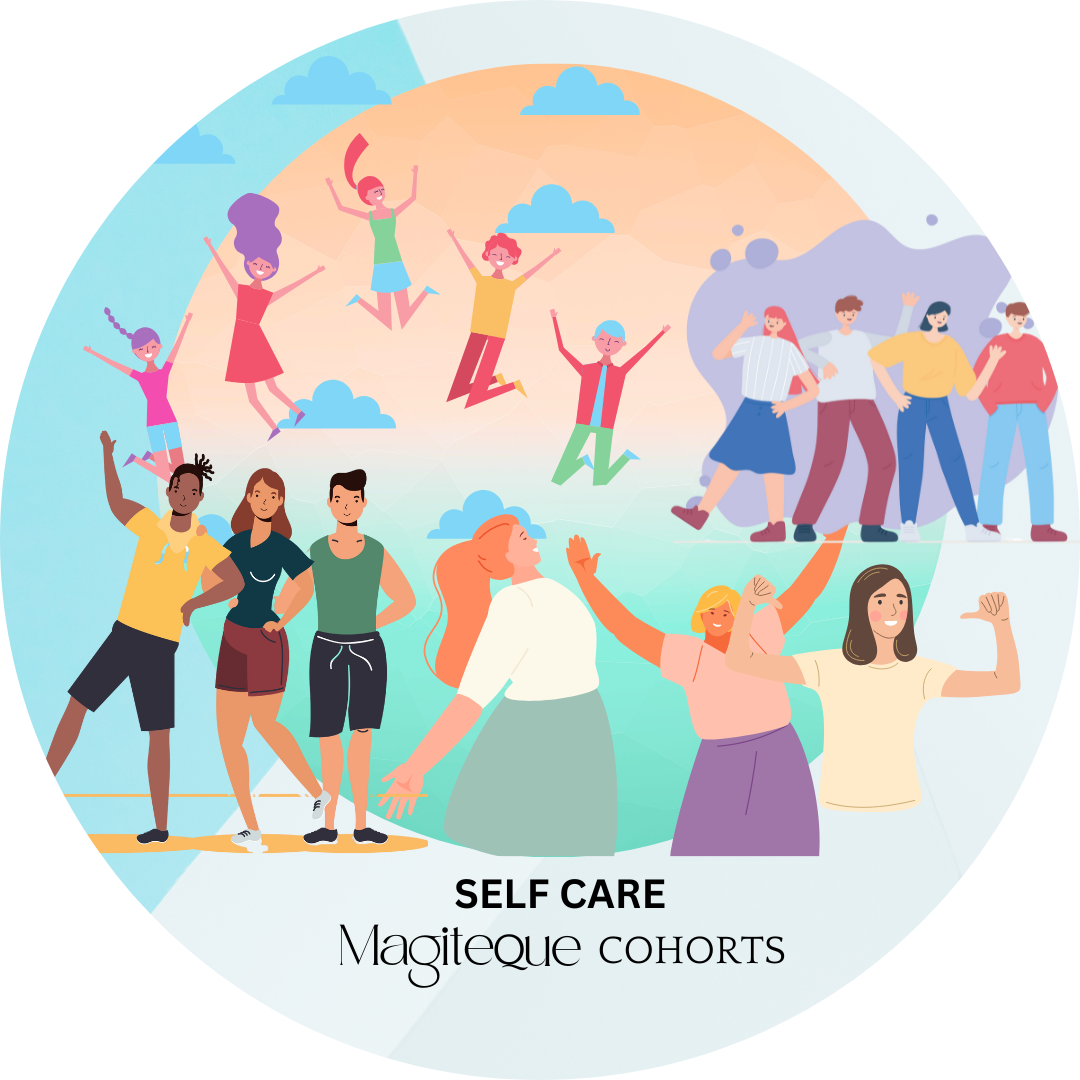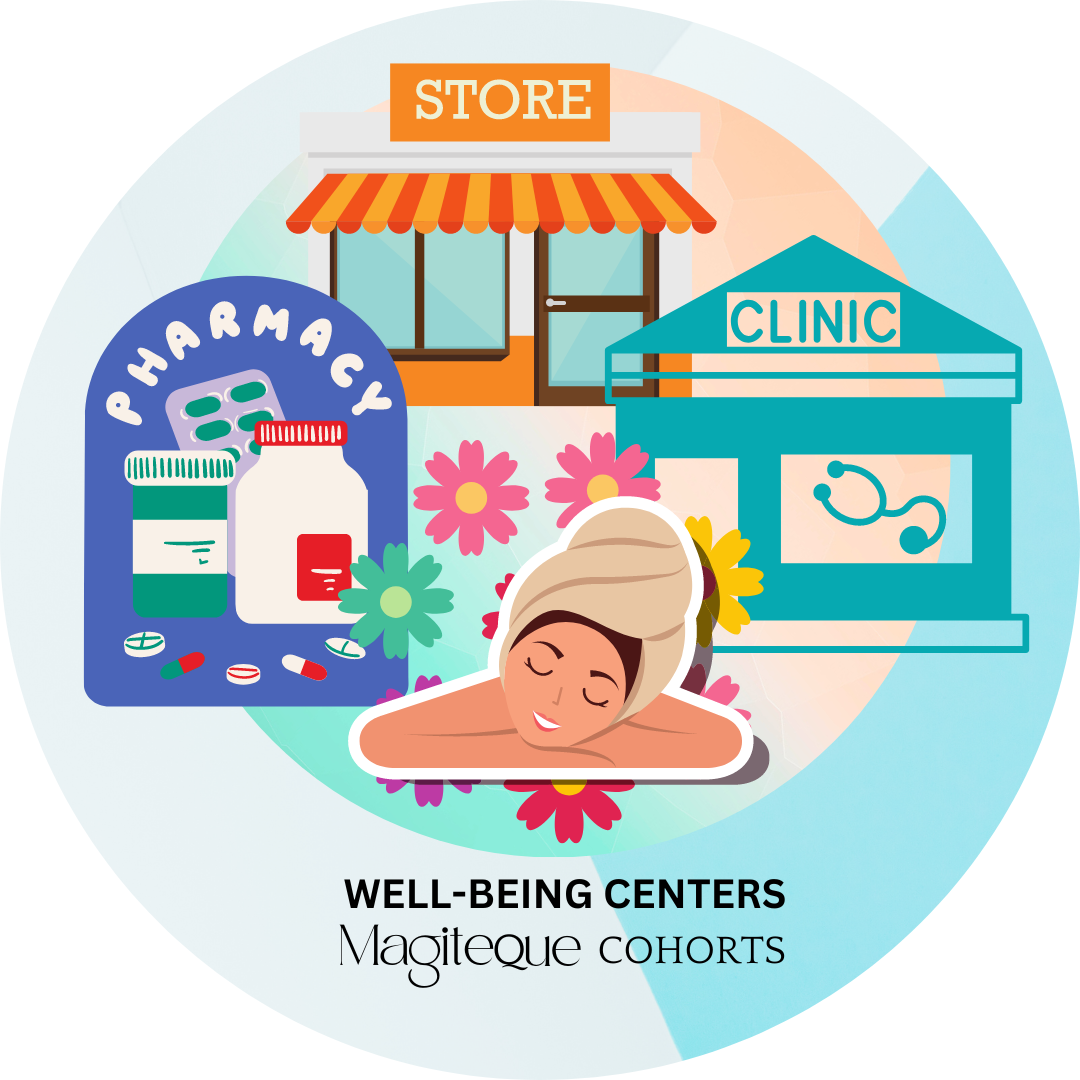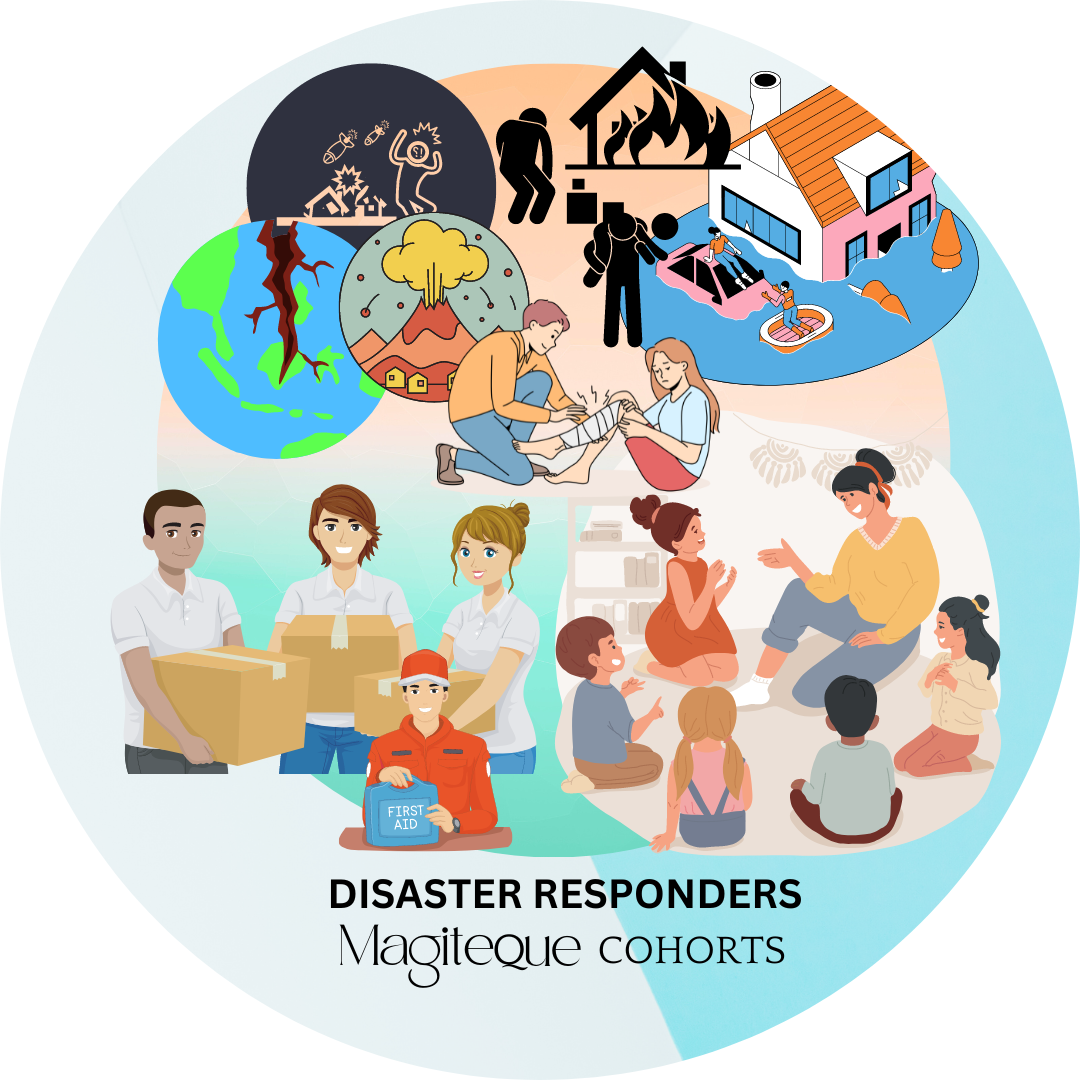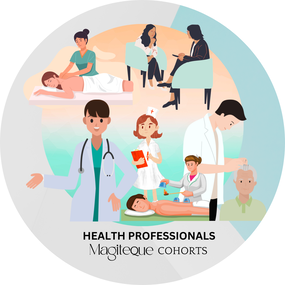MAGITEQUE COHORT PROGRAM
Magiteque Well-being Cohorts refer to groups of individuals who come together to support and enhance their overall well-being. These cohorts can take various forms, such as support groups, wellness programs, or community-based initiatives. Magiteque Cohorts are clustered according to interest and needs.
The purpose of Magiteque well-being cohorts is to create a supportive environment where individuals can connect with others who share similar goals or experiences related to Well-Being. Magiteque Well-Being Cohorts provide a space for members to engage in theoretical and experiential learning activities, discussions, and practices that promote physical, mental, and emotional health.
Well-being cohorts can focus on a wide range of topics, including stress management, mindfulness, fitness, nutrition, self-care, and personal development. They are organized within workplaces, educational institutions, community centers, and online platforms.
The benefits of participating in Magiteque Well-Being Cohorts include social support, accountability, motivation, and the opportunity to learn from others who have similar interests or challenges. By fostering a sense of community and shared purpose, Magiteque Well-Being Cohorts can contribute to the overall well-being and resilience of their members and community. The following are the clusters of Well-Being Cohort. If you feel and think that you would like to become a Magiteque Well-Being Cohort, you may communicate your interest by registering and tell us why you should be included in our roaster of Magiteque Well-Being Cohort worldwide.
The purpose of Magiteque well-being cohorts is to create a supportive environment where individuals can connect with others who share similar goals or experiences related to Well-Being. Magiteque Well-Being Cohorts provide a space for members to engage in theoretical and experiential learning activities, discussions, and practices that promote physical, mental, and emotional health.
Well-being cohorts can focus on a wide range of topics, including stress management, mindfulness, fitness, nutrition, self-care, and personal development. They are organized within workplaces, educational institutions, community centers, and online platforms.
The benefits of participating in Magiteque Well-Being Cohorts include social support, accountability, motivation, and the opportunity to learn from others who have similar interests or challenges. By fostering a sense of community and shared purpose, Magiteque Well-Being Cohorts can contribute to the overall well-being and resilience of their members and community. The following are the clusters of Well-Being Cohort. If you feel and think that you would like to become a Magiteque Well-Being Cohort, you may communicate your interest by registering and tell us why you should be included in our roaster of Magiteque Well-Being Cohort worldwide.
|
SELF CARE MAGITEQUE WELL-BEING COHORT
A self-care well-being cohort is a group of individuals who come together with the common goal of promoting and prioritizing self-care and overall well-being. These cohorts provide a supportive community where members can share experiences, resources, and strategies for self-care, personal growth, and well-being enhancement. Self-care well-being cohorts typically focus on various aspects of self-care, including physical, mental, emotional, and spiritual well-being. You can incorporate practices such as mindfulness, meditation, exercise, healthy nutrition, stress management, relaxation techniques, goal setting, and self-reflection. Magiteque Well-Being Cohort for Self-Care includes the following benefits: Support and Encouragement, Accountability, Learning and Growth, Connection and Community. |
|
PATIENT AND CAREGIVER MAGITEQUE WELL-BEING COHORT
A Patient and Caregiver Well-Being Cohort is a group or community specifically designed to support the well-being of both patients and their caregivers. It brings together individuals who are going through similar experiences, providing a supportive environment where they can share challenges, resources, and strategies for coping, self-care, and overall well-being. Patient and caregiver well-being cohorts focus on addressing the unique needs and stresses faced by individuals dealing with health conditions, chronic illnesses, or caregiving responsibilities. They often provide a space for open communication, understanding, and mutual support among participants. Some key benefits and features of patient and caregiver well-being cohorts are: Peer Support, Information and Resources, Coping Strategies, Advocacy and Empowerment, Practical Guidance. |
|
WELL-BEING CENTERS MAGITEQUE WELL-BEING COHORTS
Business establishments and Organization Well-Being Cohort encompass various types of organizations that focus on promoting health, wellness, and overall well-being. Here are examples of organizations that could be part of a well-being cohort: Wellness Spa: Wellness spas often offer a range of services aimed at promoting relaxation, stress reduction, and overall well-being. Pharmacy: Pharmacies play a crucial role in healthcare by providing prescription medications, over-the-counter drugs, and health-related products. Health Clinic: Health clinics, including primary care clinics, specialized clinics, or community health centers, provide medical services and preventive care. Hospital: Hospitals are integral to the healthcare system, providing comprehensive medical services, emergency care, surgeries, and specialized treatments. Convenience Store: While convenience stores primarily focus on providing everyday items and convenience products, some stores have started incorporating healthier food options, organic products, and wellness sections. Well-being Organizations: Well-being organizations, such as non-profit organizations or community groups, are specifically dedicated to promoting health and well-being. |
|
VOLUNTEER DISASTER RESPONDERS MAGITEQUE WELL-BEING COHORTS
Disaster responders and volunteers play a crucial role in emergency situations, providing assistance, support, and relief efforts to affected communities. Given the demanding and often stressful nature of their work, it is important to prioritize the well-being of these individuals. Well-being cohorts or programs specifically designed for disaster responders and volunteers can provide essential support and resources. Peer Support Networks: Peer support networks or organizations within the disaster response community can create well-being cohorts that foster connections and mutual support among responders and volunteers. Training and Education: Well-being programs for disaster responders often include training and education on self-care, resilience-building techniques, and stress management. Mental Health Services: Access to mental health services, such as counseling or therapy, is essential for responders and volunteers. Post-Deployment Support: Well-being cohorts can provide ongoing support for responders |
and volunteers even after their deployment ends. This may include follow-up care, debriefing sessions, or access to resources for managing post-traumatic stress and transitioning back to daily life.It's important for disaster response organizations and volunteers to collaborate and prioritize the well-being of responders. Creating a culture of well-being and ensuring access to support resources is crucial for maintaining the mental, emotional, and physical health of those involved in disaster response efforts.
If you are a disaster responder or volunteer, consider reaching out to your organization or relevant support networks to explore available well-being initiatives and resources tailored to your needs. Taking care of your well-being not only benefits you personally but also enables you to provide more effective support to those affected by disasters.
Magiteque Well-Being Cohort is here to help bring innovative solution for stress and pain management PTSD Prevention and Care the Human System Approach.
If you are a disaster responder or volunteer, consider reaching out to your organization or relevant support networks to explore available well-being initiatives and resources tailored to your needs. Taking care of your well-being not only benefits you personally but also enables you to provide more effective support to those affected by disasters.
Magiteque Well-Being Cohort is here to help bring innovative solution for stress and pain management PTSD Prevention and Care the Human System Approach.
|
HEALTH AND ALLIED HEALTH PROFESSIONALS AND NATUROPATH PRACTITIONERS AND HEALTH COACHES AND THERAPISTS
A cohort of health professionals and allied health professionals dedicated to providing well-being solutions to patients can be a valuable resource for promoting holistic health and improving patient outcomes. This type of cohort focuses on integrating well-being practices into healthcare settings to address the physical, mental, and emotional needs of patients. Here are some key aspects and examples of initiatives that can be part of a well-being cohort for healthcare professionals providing well-being solutions to patients: Collaborative Care Approach: The cohort can promote a collaborative care approach, where healthcare professionals from various disciplines work together to address the overall well-being of patients. Patient Education and Empowerment: The cohort can develop educational materials, workshops, and programs aimed at empowering patients to take an active role in their own well-being. This may include providing information on healthy lifestyles, self-care practices, stress management techniques, and resources for managing specific conditions or concerns. |
Well-being Assessments: Conducting well-being assessments can help healthcare professionals gain a comprehensive understanding of a patient's overall well-being. This assessment can cover physical health, mental health, social support, lifestyle factors, and other determinants of well-being.
Well-being Prescriptions: Healthcare professionals can integrate well-being prescriptions into their practice, recommending evidence-based well-being interventions alongside traditional medical treatments. This may include prescribing activities such as exercise, mindfulness practices, stress reduction techniques, or referring patients to specific well-being resources or programs.
Mind-Body Interventions: Incorporating mind-body interventions such as meditation, yoga, tai chi, or relaxation techniques into patient care can promote well-being, reduce stress, and support overall health. Healthcare professionals within the cohort can collaborate to provide guidance and resources for patients interested in these practices.
Outcome Evaluation: Regularly evaluating the impact of well-being interventions and tracking patient outcomes is important. This helps healthcare professionals assess the effectiveness of their well-being solutions, make necessary adjustments, and provide evidence for the integration of well-being practices in healthcare settings.
Creating and sustaining a well-being cohort for healthcare professionals requires collaboration, ongoing education, and a shared commitment to patient-centered care. By incorporating well-being solutions into patient care, healthcare professionals can address the broader health needs of individuals, enhance their quality of life, and promote overall well-being.
If you are a healthcare professional interested in promoting well-being solutions for patients, consider collaborating with Magiteque as We focused on integrative care, and exploring resources provided by well-being-focused organizations. Embracing a holistic approach to patient care can have a positive impact on patient well-being and overall health outcomes.
Well-being Prescriptions: Healthcare professionals can integrate well-being prescriptions into their practice, recommending evidence-based well-being interventions alongside traditional medical treatments. This may include prescribing activities such as exercise, mindfulness practices, stress reduction techniques, or referring patients to specific well-being resources or programs.
Mind-Body Interventions: Incorporating mind-body interventions such as meditation, yoga, tai chi, or relaxation techniques into patient care can promote well-being, reduce stress, and support overall health. Healthcare professionals within the cohort can collaborate to provide guidance and resources for patients interested in these practices.
Outcome Evaluation: Regularly evaluating the impact of well-being interventions and tracking patient outcomes is important. This helps healthcare professionals assess the effectiveness of their well-being solutions, make necessary adjustments, and provide evidence for the integration of well-being practices in healthcare settings.
Creating and sustaining a well-being cohort for healthcare professionals requires collaboration, ongoing education, and a shared commitment to patient-centered care. By incorporating well-being solutions into patient care, healthcare professionals can address the broader health needs of individuals, enhance their quality of life, and promote overall well-being.
If you are a healthcare professional interested in promoting well-being solutions for patients, consider collaborating with Magiteque as We focused on integrative care, and exploring resources provided by well-being-focused organizations. Embracing a holistic approach to patient care can have a positive impact on patient well-being and overall health outcomes.




